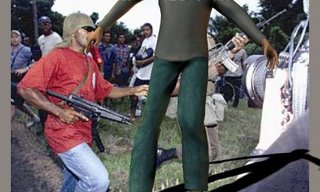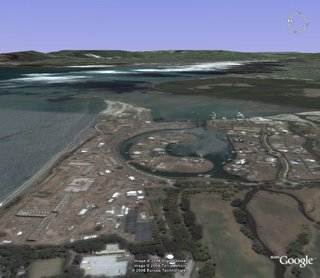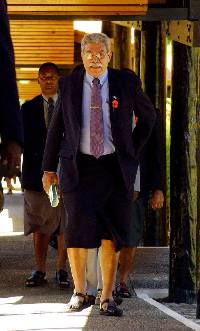The attempt by Fiji P.M to refloat the controversial and reworded Reconciliation, Tolerance and Unity (R.T.U)Bill is another reminder that the ghosts of 2000 have yet to be laid to rest.
Insert-Minister of Vice- Naiqama Lalabalavu(M.P Cakaudrove) and Sam Tikonaisau (M.P Tailevu and brother of George Speight-2000 coup leader) both of whom been involved with the 2000 post-coup events.
It is apparent the S.D.L party, provides political buoyancy to the R.T.U Bill which is bound to create another wedge in Fiji society. S.D.L has some support from some circles of the Fiji media like the political editor of Fiji Sun, Messr Maika Bolatiki.
This is an
excerpt of his article.
Push for new-look RTU Bill
By Maika Bolatiki
Political Editor
The Multi-Party Government will table a new look Reconciliation, Tolerance and Unity Bill in the near future. The President, Ratu Josefa Iloilo in his address at the opening of parliament said: "The Promotion of Reconciliation, Tolerance and Unity Bill, introduced last year, will be brought back to Parliament with a largely revised framework for further consideration. It will take full account of the recommendations of the Parliamentary Sector Committee which held wide consultations with the people." The Prime Minister, Mr Laisenia Qarase has confirmed that a new Bill will be submitted to parliament with changes including significant amendments to the Amnesty provisions.
A new round of public hearings is likely, he said at the Joint Session of National Advisory Council for Indian and Minority Communities at the Tradewinds Convention Center last month. This follows the negative comments directed at the Amnesty clause of the proposed Reconciliation, Tolerance and Unity Bill. "We repeatedly emphasized that there would be no general amnesty and that other parts of the Bill were of equal or even greater importance.
These provisions were virtually ignored by the critics." Prime minister Qarase said. The Prime Minister made it clear that they had an open mind about the public debate and attached great importance to the view of the people with changes, improvement and clarification to be made, as necessary. He reiterated that one of the Bill's vital section concerns the appointment of a permanent Reconciliation, Tolerance and Unity Council, with its own legislation.
"It will replace the existing Council for National Reconciliation and Unity, which does not have any special legal foundation or power," he said "The new Council will play an important part in our National effort to bridge divisions between our communities." The Council will adopt a National policy for National Reconciliation and have the authority to take specific initiates for achieving greater multi-cultural understanding The Prime Minister is optimistic that the granting of amnesty to those who were involved would enable them to tell the whole truth about what had transpired.
It is a fact that the nation is still haunted by the ghost of the May 2000 political upheaval. Both the Fiji Labour Party and the National Federation Party are totally against the Bill, but had strongly backed the call by Commissioner of Police Andrew Hughes for a Commission of Inquiry In a statement by FLP leader Mahendra Chaudhry, he said the government should institute a public inquiry to establish the truth of what happened in 2000 and key players behind the terrorist activities.
"The unlawful takeover of parliament, the 56-day hostage crisis and the months of violence and mayhem that followed, wrecked the economy brought untold suffering to thousands of innocent people and led to loss of lives," Mr Chaudhry said."Although some people have been persecuted and convicted for their part of the coup, a lot still needs to be revealed We still don't know who the real instigators were, nor have we tracked down the financiers of the coup."
The same call had also been echoed by Josefa Nata, one of the key players in the political upheaval of May 2000. He is now serving a life sentence at Nukulau. The FLP leader said that the party knew that former coup-convict Maciu Navakasuasua is also prepared to testify before an inquiry. According to Mr Chaudhry the people of Fiji want an inquiry. Government he says must take heed of this. It should stop wasting time and money on the controversial RTU Bill, stop releasing people convicted of coup-related crimes and set up a national inquiry, headed by an eminent jurist, into the events of 2000.
Let us take a look at how amnesty will be granted under this Bill and I'm looking at the Bill that was tabled in parliament last year. First of all I will clarify why amnesty was granted to those involved in the 1987 coup and not to those involved in the 2000 coup. 1987 coup leader and former Prime Minister Sitiveni Rabuka said the only difference between the two coups was that the 1987 coup leader managed to exercise control of the country and actually ran an effective "government' albeit "defacto". He managed to run the government with the army and police and the Courts, which were sworn- in. As a result, the position of the Queen in Fiji became "untenable" and Her Majesty's representative here, acknowledging that, resigned, effectively heralding in the new system of a republican government headed by a Military - appointed and supported administration which enabled the transition from the "defacto" state to a "dejure" state, allowing the Military to appoint a President of the Republic.
The 2000 attempt failed to take control of anything and could not exercise any authority to eclipse the legitimate authority of the land.
2000 coup leader George Speight and his supporters according to Mr Rabuka took on something they knew nothing about. The military intervened but the alternative was for them to have disregarded the request of the former President not to be asked to return to the Presidency, and for the Army to restore law and order, return Ratu Sir Kamisese to the Presidency and allow him then to negotiate with Mr. Chaudhry on the way forward.
There was no police investigation against Mr Rabuka and the military about the 1987 coup because they became the law. They were granted amnesty and this was included in the 1990 Constitution and also in the 1997 Constitution. However, there is a great difference in the amnesty section of the Unity Bill. In the current legislation, prisoners could be freed under compulsory supervision order (CSO). This is under the discretion of the Commissioner of Prisons, under the Prerogative of Mercy and under the directive of the Minister for Home Affairs.
Let us have a look at why the granting of amnesty in the new Bill is totally different from the amnesty granted to Mr Rabuka and his colleagues. When they were granted amnesty, they did not make any revelation to the public or a committee as to why they carried out the coup. For amnesty to be granted to someone imprisoned for his involvement in the 2000 coup he will have to make an application to the Commission. Upon receiving an application for amnesty, the Commission may - * reject the application if it is trivial, frivolous or vexatious or that it relates to an act which is not connected with a political objective or on the ground that it is an act committed outside the designated period; or * refer the application to the Amnesty Committee to hear the application. For the applicant, he must successfully argue that an act was associated with a political objective and was not purely criminal. If the argument is not accepted, there will be no amnesty. There has to be a full and truthful disclosure under oath of all the relevant facts. If a lie is told, perjury is committed.
Without this full disclosure, there is no amnesty. The country needs to know the truth about the events of 2000. This is government's last bid for reconciliation and unity. Mr Chaudhry is also party to the political upheaval after he had ignored the advice by the police of a possible coup and that no permit for marches should be granted.
The granting of amnesty will persuade the people involved in the coup to come forward and relate the whole truth of what had happened. Mr Chaudhry in supporting the Commission of Inquiry supports the revelation of the whole truth about the May 2000 upheaval. This is what will also be achieved in the RTU Bill when it is enacted. It is a fact that the FLP leader supports the RTU Bill through a Commission of Inquiry. We should be happy that the Prime Minister has confirmed the amnesty section will be amended.
Point of correction, F.L.P leader has never supported the R.T.U Bill. Messr Chaudary has indicated his support for the commission of inquiry. To report that the F.L.P leader is supportive of the R.T.U Bill without stating when or where this comment was made; underlines the obtuse reporting by Fiji Sun's political editor. There is a demarcating line between the two issues. It is disconcerting to see these lines intentionally blurred by the Fiji media, acting on a hidden agenda that is far divorced from the intentions of the people of Fiji.
The article writer contradicts himself- by initially stating that the new R.T.U Bill has withdrawn amnesty provisions. Yet in the last paragraph, "Without this full disclosure, there is no amnesty".
By the writer's own words, the Amnesty provision still exists. Although, there are some conditions like providing truth disclosure of the events they participated in, to a relatively unknown committee.
As far as S.i.F.M is concerned, this watered-down bill is still unacceptable and makes a mockery of the rule of law.
R.T.U Bill's intentions are noble to a select few, yet appears grossly malicious in nature to the silent majority.
What if the R.T.U sub-committee are also the same members of parliament, who have been investigated for their participation in the post coup events? Keeping in mind that the trial for the 2000 coup planners and executioners, is yet to be undertaken. It would be a great injustice, a slap in the face of the law abiding, honest and hard working people of Fiji to have this R.T.U Bill supersede existing jurisprudence.
Home Affairs C.E.O, Lesi Korovalavala has taken upon himself to spearpoint any
media criticisms of this Bill, by conveniently labeling it as sensationalism.
Judging from the C.E.O's narrow definition, he would even label the
vitriolic attack of the visiting Princess Anne as sensationalism. As well as the Fiji's national netball team's win over South Africa recently.
The words of the Korovalavala is also an indication that the gaunlet has been dropped against detractors. S.i.F.M is always delighted to pick it up, on behalf of the silent majority, the common people of Fiji.
Here is the reworded inscription of the statue of liberty, that sums up S.i.F.M's general philosophy.
"Give me [the issues of] your tired, your poor,
Your [concerns of intolerance, for the]huddled masses yearning to breathe free,
The [tears of injustice from the]wretched refuse of your teeming shore.
Send these [reports of abuse and degradation], the homeless, tempest-tossed to me.
I lift my lamp[of knowledge] beside the golden door [of life, liberty and the pursuit of happiness]."
Click here for live cam of the Statue of Liberty.
Club Em Designs


























